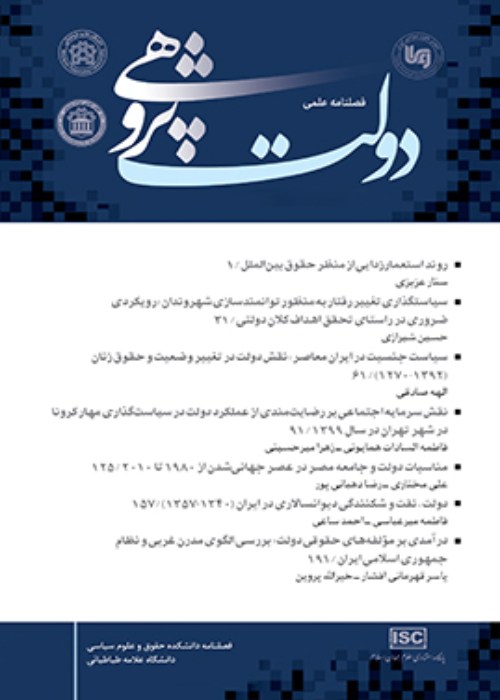The Relationship Between the Iraqi State and The Militia Groups After 2014 (Case Study of Hashd Al-Shaabi)
After the massive and sudden attack of ISIS on Iraq, the existence of the Iraqi state and nation and the sanctities of Muslims were under serious threat. While ISIS was approaching gates of Baghdad and the Iraqi army and security forces were not able to deal with it, with Ayatollah Sistani's fatwa regarding jihad to confront ISIS and ward off this real danger, a defense-security organization called Hashd al-Shaabi, consisting of volunteers People and militia groups, which are considered the military arm of Iraqi political parties and currents, were formed. The Iraqi state, which was in a state of emergency, supported the formation of this new defense-security organization and provided it with financial, logistical and weapons support. With the threat of ISISremoval and the end of state of emergency, the existence of such an organization, which is mainly controlled by militia groups, has become a significant challenge for Iraqi state, which seeks to obtain a monopoly on the use of legitimate force. Therefore, after 2014, all heads of the Iraqi government have tried to prevent the formation of a parallel defense-security institution outside the government's control by adopting different strategies. This article, in which the data has been collected by referring to library and online sources and explained and analyzed with a descriptive-analytical method, seeks to find an authentic answer to this question: "The relationship between the Iraqi government and Hashd al-Shaabi and its constituent militia groups. How has it been?" The findings of the article show that the relationship between the Iraqi government and the militia groups was subject to the requirements of the time in such a way that in emergency and threatening situations, the government used the capacity of these groups and in the absence of these conditions, these groups were considered by the government as a disturbing, undesirable and threatening element, a range of control policies and strategies have been applied to them by the Iraqi government. In the post-crisis era, the Iraqi government, as a system actor that considers itself committed and accountable to the existing rules, norms and order, cannot support the anti-systemic actions of the militia groups that it cooperated with and supported during the ISIS crisis in the form of Hashd al-Shaabi. to bear Therefore, since 2014, the governments of Haider al-Abadi, Adel Abdul Mahdi and Mostafa Al-Kazemi have tried to control these groups as much as possible through adopting a series of strategies and measures. Among the four strategies of repression, containment, collusion and integration, these governments have put two strategies of collusion and integration on their agenda. The reason for choosing these two strategies is that, firstly, Hashd al-Shaabi and its constituent groups are still considered strategic allies of the government, and the political currents of which these groups are considered as their military arm participate in the political process and in the formation of the government. Secondly, even if these groups strongly deviate from the government's criteria and the relationship between the militia groups turns from reconciliation to conflict, the Iraqi government does not have the ability to restrain or suppress these groups. In the collusion strategy, the Iraqi government tries to relatively control the actions of Hashd al-Shaabi groups by granting some concessions and through financial and logistical support tools. As well, in the integration strategy, the Iraqi government has put the recruitment of the Hashd al-Shaabi and its integration in the official Iraqi defense-security structures on its agenda, and the heads of the Iraqi government have issued orders and adopted measures in this regard. Collusion and integration strategies have not been able to be fully and effectively implemented due to the resistance and opposition of the commanders of the militia groups and their insistence on their organizational independence and ideological and identity foundations, and these two strategies have only been implemented superficially and formally.
- حق عضویت دریافتی صرف حمایت از نشریات عضو و نگهداری، تکمیل و توسعه مگیران میشود.
- پرداخت حق اشتراک و دانلود مقالات اجازه بازنشر آن در سایر رسانههای چاپی و دیجیتال را به کاربر نمیدهد.



